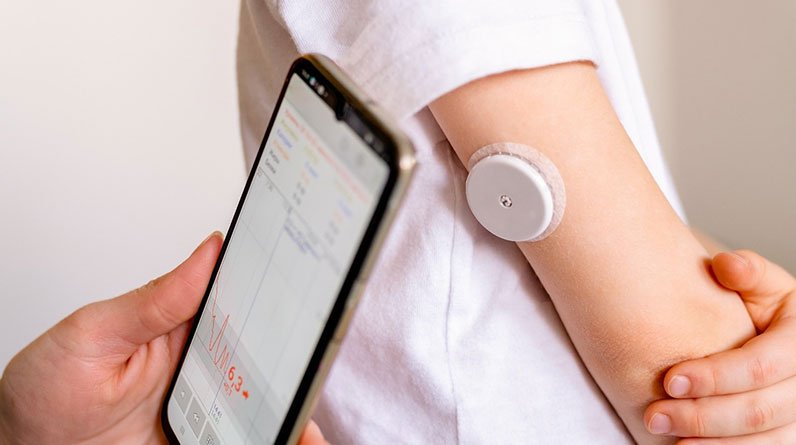
AI in Endocrinology – Diabetes
Diabetes, characterized by elevated blood sugar levels, affects millions worldwide and necessitates vigilant monitoring and precise interventions to prevent complications.
In the area of endocrinology, AI has become a transformative force in diabetes management, promising more accurate diagnosis, risk prediction, and personalized treatment strategies.
In what follows, we’ll be exploring the power of artificial intelligence in diabetes management and its capacity to help diagnose and treat diabetes at the source.
The Power of AI in Diabetes Management
The landscape of diabetes management is continuing to improve dramatically as AI is creating a much-improved situation for individuals with this condition. AI is showing remarkable proficiency in providing more effective and personalized care.
AI works across various facets of care and shows its power with real-time application in continuous glucose monitoring systems and closed-loop insulin delivery systems via predictive models and algorithms.
Continuous Glucose Monitoring (CGM)
One of the most profound impacts of AI in diabetes management lies in the realm of continuous glucose monitoring (CGM). Traditionally, individuals living with diabetes had to endure multiple daily finger sticks with a needle to monitor their blood glucose levels.
However, the introduction of CGM systems has changed the game. These advanced systems employ tiny sensors to continuously measure glucose levels in the interstitial fluid, offering a real-time and comprehensive view of an individual’s glucose trends.
The data gathered by CGM devices is transmitted to a dedicated receiver or smartphone app, providing users and healthcare providers with immediate insights. This real-time feedback empowers patients to make informed decisions about their dietary choices, insulin dosages, and activity levels.
Closed-Loop Insulin Delivery Systems
Closed-loop insulin delivery systems, often referred to as the “artificial pancreas” or sometimes referred to as an “insulin pump,” represent another groundbreaking development in diabetes care made possible by AI. These intelligent systems combine CGM technology with automated insulin delivery, creating a seamless feedback loop.
The system constantly monitors glucose levels and administers insulin accordingly, aiming to keep the patient’s glucose within their target range. This automation not only reduces the burden on individuals with diabetes but also significantly lowers the risk of hypoglycemia (dangerously low blood sugar) and hyperglycemia (dangerously high blood sugar).
The artificial pancreas concept is a major leap forward in diabetes management, offering greater stability and control over blood glucose levels.
Predictive Algorithms
Finally, AI-driven predictive algorithms have introduced a new dimension to diabetes care by anticipating glycemic events before they occur. These algorithms analyze a patient’s historical glucose data, lifestyle factors, and other pertinent information to predict potential fluctuations in blood sugar levels.
For individuals with erratic glucose patterns or those at higher risk of hypo or hyperglycemic episodes, these predictions can be invaluable. They allow for proactive interventions, such as adjusting insulin doses or making dietary modifications, to stabilize glucose levels and prevent complications.
AI’s predictive capability empowers both patients and healthcare providers to stay one step ahead of diabetes, enhancing overall quality of life and reducing the risk of long-term health issues.
AI’s Capacity to Diagnose and Treat Diabetes
The impact of AI extends to crucial aspects of diabetes care, from early detection of diabetic retinopathy to the realm of precision medicine, helping healthcare professionals diagnose and treat those with diabetes.
Diabetic Retinopathy Detection
Diabetic retinopathy, a severe diabetes complication affecting the eyes, can lead to blindness if left undiagnosed and untreated. AI plays a pivotal role in streamlining the process of retinopathy screening by automating the grading of retinal images.
This automated approach not only expedites the identification of retinopathy but also facilitates early intervention of similar symptoms, potentially preventing vision loss or possibly other diabetic-related complications.
Prediction and Risk Stratification
AI’s predictive ability extends to forecasting the progression of diabetes-related conditions. Machine learning models analyze patient data, including electronic health records, to predict critical milestones in an individual’s diabetes journey.
For instance, algorithms have been developed to anticipate the transition from pre-diabetes to type 2 diabetes. By identifying high-risk individuals, these models help healthcare providers implement early interventions, thereby reducing the overall burden of the disease.
Personalized Treatment Plans
AI’s capacity to analyze genomic data opens the door to highly personalized diabetes treatment plans. In certain cases, machine learning techniques have been utilized to detect specific genetic mutations to guide treatment decisions.
By examining an individual’s genetic makeup, healthcare professionals can customize treatment strategies, optimizing their efficacy and minimizing potential side effects. This level of personalization ensures that diabetes care aligns precisely with each patient’s unique physiology, enhancing treatment outcomes and patient satisfaction.
Precision Medicine
AI is laying the foundation for precision medicine in diabetes care. By scrutinizing a patient’s genetic profile, lifestyle choices, and other relevant factors, AI-driven systems can craft treatments tailored to the individual’s precise needs.
This approach optimizes treatment efficacy and minimizes adverse effects. In essence, precision medicine in diabetes care ensures that no two treatment plans are alike, reflecting the unique characteristics of each patient. It represents a promising future where diabetes management is reactive and proactive, offering the best possible outcomes for those with this chronic condition.
Final Thoughts
AI is orchestrating a paradigm shift in the field of endocrinology, particularly in diabetes management and diagnostics. With AI’s ability to run insulin pumps, continuously monitor glucose levels, automate retinopathy screening, predict disease progression, tailor treatments, and usher in the era of precision medicine, healthcare professionals can offer more precise, timely, and effective care.


